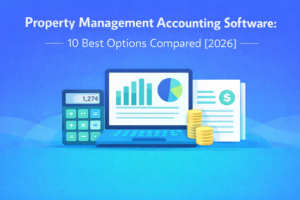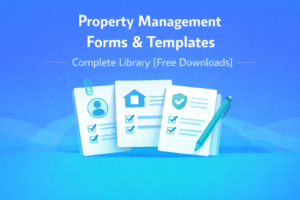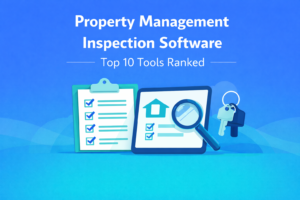
Are you starting your exciting property management journey or already on your way, looking to take your career to new heights? Navigating through the sea of acronyms and overwhelming information online can feel daunting.
But don’t worry! We’re here to provide the clarity you need and information about property management certifications and licenses.
Certain certifications can be crucial milestones on your road to success, depending on where you are, your experience level, and your long-term goals. Others might give you that extra edge in the industry. By getting the proper certifications and licenses, you’ll position yourself as a knowledgeable and capable property management pro, ready to take on any challenge.
Let’s understand more about these certifications and licenses in this blog.
Property Management Certification Benefits
Property management certification comes with a host of benefits for professionals in the industry. First and foremost, it boosts credibility and showcases expertise in property management practices.
These certifications validate your knowledge and skills, making you more marketable in the job market. Plus, they open doors to higher-level positions, increase earning potential, and expand your career opportunities.
Employers often prefer certified property managers, appreciating their specialized knowledge and professionalism. On top of that, certification offers access to a network of industry professionals, fostering collaboration, knowledge-sharing, and even potential mentorship opportunities.
And let’s not forget the ongoing professional development requirements that keep certified property managers up to date on industry trends and best practices, ensuring continuous growth and success in their careers.
Now, let’s explore what certifications and licenses can provide a significant competitive advantage in the property management industry.
1. Property Management Organizations
There are many certifications available that are linked to specific property management or real estate associations.
These certifications are tailored to different aspects of the industry. By joining these organizations, you not only add credibility but also gain access to valuable training programs, networking opportunities, and industry insights.
It’s a great way to connect with like-minded professionals and stay updated on the latest trends, best practices, and regulations. Plus, it gives you a competitive edge in the property management or real estate market.
Here are five influential organizations in the field:
Institute of Real Estate Management (IREM): A global organization with nearly 20,000 members, offering internationally recognized training and certifications for real estate professionals.
National Apartment Association (NAA): With over 93,000 member companies globally, NAA emphasizes support, training, and education for apartment owners and operators.
National Association of Residential Property Managers (NARPM): An international association for real estate professionals managing single-family or small residential properties, offering globally recognized certifications.
(NAR) National Association of Realtors : Providing training and certification for real estate professionals, with over 200,000 members earning the title of realtor.
Community Association Managers International Certification Board (CAMICB): An internationally recognized organization focusing on standards of conduct for community associations.
2. Property Management Musts: Licenses and Certifications

In the world of property management, specific certifications are a must-have. They elevate your legitimacy and make you more marketable. For example, in most states, you’ll need a real estate broker’s or property manager’s license to meet the necessary qualifications.
We highly recommend becoming a Certified Property Manager (CPM) if you want to go above and beyond. It’s not mandatory, but it’s worth it. The CPM, administered by the Institute of Real Estate Management (IREM), is considered the gold standard.
It gives property managers prestige and international recognition. By getting these certifications and affiliating yourself with reputable organizations, you’ll establish yourself as a trusted and knowledgeable professional in property management.
3. PM Certifications to Boost Your Career
Several certifications cater to different aspects of property management, allowing you to tailor your expertise.
Here are a few noteworthy certifications:
- Residential Management Professional (RMP) by NARPM: Similar to IREM’s CMP certification, requiring the management of 100 units over two years and holding a real estate broker’s license.
- Master Property Manager (MPM) by NARPM: The highest designation within NARPM, attainable after achieving RMP and managing 500 units over five years.
- Accredited Residential Manager (ARM) by IREM: Designed for newer property managers, requiring 12 months of qualifying real estate management and completion of required coursework.
- Certified Apartment Manager (CAM) by NAA: Intended for those handling apartment rentals, requiring a year of onsite management experience.
- Certified Manager of Community Associations (CMCA) by CAMICB: Enhances income by 20%, open to community association managers with relevant experience.
Besides individual certifications, there are also certifications available for property management companies.
For instance:
Certified Residential Management Company (CRMC) by NARPM: Attainable after an employee achieves MPM, requiring an onsite audit within three years.
Accredited Management Organization (AMO) by IREM: A prestigious company certification demonstrating expertise in the field.
4. Property Management Credentials
Continuing education is crucial in property management. Professionals in this field must stay updated with industry knowledge and trends.
One way to achieve this is by obtaining credentials from reputable property management organizations. These credentials cover various topics, including marketing strategies, ethical practices, and specialized skills.
By earning these credentials, property managers can enhance their expertise, credibility, and effectiveness in managing properties and providing exceptional client services.
- Certificate for Apartment Maintenance Technician (CAMT): Aimed at new property maintenance professionals.
- Certified Apartment Leasing Professional (CALP): Focuses on leasing skills.
- Certified Apartment Supplier (CAS): Enhances sales knowledge for industry veterans.
- Independent Rental Owner Professional (IROP): Designed for rental owners managing properties, covering budget management, tax planning, and resident qualification.
- Specialist in Housing Credit Management (SHCM): Master the requirements of the Low-Income Housing Tax Credit (LIHTC) program.
- Credential for Green Property Management (CGPM): Meets HUD Office of Affordable Preservation (OAHP) training commitments for green restructuring.
- Certified Support Specialist (CSS): Provides industry-specific knowledge for administrative staff.
Charting Your Property Management Success
For newcomers looking to enter the property management field, starting by obtaining a real estate broker’s license is a smart and strategic move. By doing so, you not only demonstrate your commitment and dedication to the industry but also gain valuable knowledge and skills that will set you apart from the competition.
If you want to boost your career prospects, discussing with employers and experienced property managers is a good idea. These conversations can give you valuable insights into the goals and objectives of the organizations you want to work with.
That way, you can choose the certifications and training programs that align with these goals. This will ensure you have the proper skill set to excel in dynamic property management.
Experienced property managers, on the other hand, should actively align their personal goals with what their organizations and certification bodies offer.
By doing this, they can continuously enhance their professional development and stay ahead of the ever-evolving demands and trends in the industry. This proactive approach will pave the way for continued success and growth in property management.
Table of Contents
Stay Updated
Subscribe to get the latest news, industry trends, blog posts, and updates...




